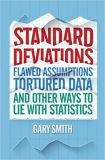Standard Deviations by Gary Smith
| Standard Deviations by Gary Smith | |
|
| |
| Category: Popular Science | |
| Reviewer: Sue Magee | |
| Summary: Written for the layman by an academic, the book conveys some quite difficult principles in clear language with plenty of examples of where statistics have been abused. | |
| Buy? Yes | Borrow? Yes |
| Pages: 304 | Date: September 2014 |
| Publisher: Gerald Duckworth | |
| ISBN: 978-0715649145 | |
|
| |
Over the years I've regularly been infuriated by the way that seemingly intelligent people abuse statistics - or perhaps misuse them deliberately to deceive us. Politicians, journalists, academics all seem to fall into the trap with alarming regularity and I was tempted into reading this book by a quote from Ronald Coase (Nobel Prize-winning Economist) that If you torture data long enough, it will confess. The author, Dr Gary Smith, taught at Yale for seven years and is now a professor at Pomona College in California. His book is aimed at the layman rather than the academic - does it hit the mark?
Smith examines statements - amongst others - which use statistics to prove that having a messy room will make you racist, that human beings have the ability to postpone death until after a major event in their lives and that you're likely to live three to five years longer if you have positive initials such as ACE rather than negative ones like DIE or DUD. Amazingly it's also been proved that men elected to the baseball Hall of Fame die, on average, five years younger than other players. Sounds convincing, doesn't it? Well, it does until you realise that some of the other players were not shown as being dead, so were treated as being alive. Some are apparently still going strong at 138...
There are dozens of examples like this and the format of the book makes for a very easy read. A subject is taken, discussed, examples given and then at the end of the chapter there's a useful summary of the main points. The ground covered is extensive. One of the main problems is that humans tend to look for patterns - and then we're seduced into thinking that this might enable us to predict what is going to happen in the future. Randomness is a subject which Smith comes back to on several occasions and its ramifications are probably the main points which I'll take away from the book. No more belief in winning streaks, or runs of bad luck!
I was horrified by the way that people are selective in their use of data (mining out the bits which support their theory and discarding anything that doesn't - to the point on one occasion of assuming that people were lying when they didn't give the 'correct' answer), or misused graphs. There are some handy hints about what to look for when examining graphs. Smith also feels that we should stop checking the numerical accuracy of statistics and look instead at the reasoning behind the theory. Studies which appear to be conclusive are often based on poor reasoning.
I have met the term 'regression to the mean' before but failed to understand it, but Smith gives clear examples which illustrate how someone who appears to have done exceptionally well - or badly - could be playing above - or below - their normal game and with time will regress to the mean. It's an interesting concept with more applications in everyday life than are immediately apparent.
Not all the examples in the book are new - but the fact that they're been out before doesn't make them any less relevant. A high proportion of the examples are American but I didn't find anything which was too confusing. My only quibble with the book is that I did find it relentlessly negative - but then what else should I have expected from a book about the abuse of statistics? To answer the question I posed in the first paragraph, the book does hit the mark. I found it an enjoyable read, had areas where I was unclear clarified and was finally convinced about randomness.
I'd like to thank the publishers for sending a copy to the Bookbag.
If this book appeals then we think that you'll also enjoy How to Predict the Unpredictable: The Art of Outsmarting Almost Everyone by William Poundstone. You might also appreciate Lotteries in Public Life by Peter Stone (editor).
Please share on: ![]() Facebook,
Facebook, ![]() Twitter and
Twitter and
![]() Instagram
Instagram
![]() You can read more book reviews or buy Standard Deviations by Gary Smith at Amazon.co.uk Amazon currently charges £2.99 for standard delivery for orders under £20, over which delivery is free. (Paid link)
You can read more book reviews or buy Standard Deviations by Gary Smith at Amazon.co.uk Amazon currently charges £2.99 for standard delivery for orders under £20, over which delivery is free. (Paid link)
![]() You can read more book reviews or buy Standard Deviations by Gary Smith at Amazon.com. (Paid link)
You can read more book reviews or buy Standard Deviations by Gary Smith at Amazon.com. (Paid link)
Comments
Like to comment on this review?
Just send us an email and we'll put the best up on the site.


